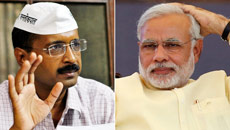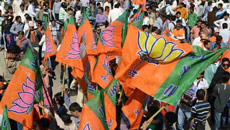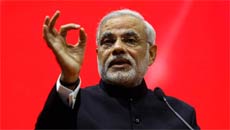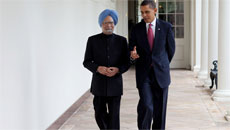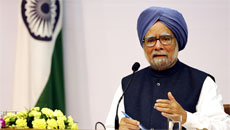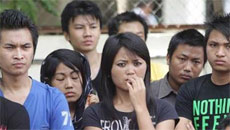Transgenders should be treated as a third category and as a socially and economically backward class entitled to job reservation, the Supreme Court said Tuesday. Activists termed the verdict "revolutionary" but said social acceptance will take longer because of the stigma associated with them.
Recognising transgenders as a third gender, the apex court bench of Justice K.S. Radhakrishnan and Justice A.K. Sikri directed the central and state governments to include them for reservation in jobs and education.
The court also said both the union and state governments would frame welfare schemes for them.
Transgenders were elated at the judgment.
"The judgment is good in terms of recognising us as the third gender, but the discrimination will continue (in society)," Shaila Jaan, a transgender, told IANS.
"Things will only change if the mentality of people towards us changes. So social awareness and change in the education system, along with acceptance will definitely bring change," she added.
Chandni, a transgender, asked how will people treat them. "Will they ridicule me or will they make an effort to know and be friends with me?"
The judgment also gave hope to the lesbian, gay, bisexual and transgender (LGBT) community.
The verdict "is important on a global level and India is one of the few countries to give this landmark judgment", gay rights activist Leslie Steven told IANS.
Filmmaker and gay activist Onir also welcomed the judgment. "This judgment also means hope to the LGBT community and we are hopeful to win that battle too," Onir, who has directed movies like "I Am" and "My Brother Nikhil", told IANS.
In Kerala, human right activists termed the court verdict as "historic and revolutionary".
"We have seen and heard about the ill-treatment meted out to transgenders because of the convention of human beings classified as male or female. They were treated as social outcasts. They will now get a new lease of life," said former CPI-M lawmaker Sebastian Paul, who is also a lawyer.
West Bengal's transgender community was also elated over the court ruling, saying it brings the promise of social security and the much-needed infrastructural support from the state and central governments.
Estimated at about 20,000, members of the third gender in the state felt it would ensure a decent livelihood, respectable source of income and part of the national census.
Ranjita Sinha, project director of the Association of Transgender/Hijra in Bengal, asserted the community's presence, particularly the eunuchs or hijras, in Indian mythology and culture, which makes their recognition as a third gender justifiable.
Many from the community who would go into sex work because of lack of options would now be entitled to education and jobs, said Santosh Kumar Giri, a third gender and secretary of the group Kolkata Rista.
Two years ago, the Election Commission allowed enrollment of transgenders under the "Others" category in electoral rolls. Since then, 28,314 transgenders have been registered across India with the poll panel.
However, there are certain "inconsistencies" which need "revision", according to gender-sexuality activist Pawan Dhall in context of the apex court ruling upholding section 377 of the Indian Penal Code, ruling that consensual gay sex between adults was illegal.
"Recognising them as a third gender means no one can point a finger at their sexual orientation whereas for lesbians and gays it is not the same. There is a contradiction in that. So the law has to be consistent with all and needs to be looked at," Dhall, a founder-member of the voluntary organisation Varta that promotes gender and sexual education in Kolkata, told IANS.
